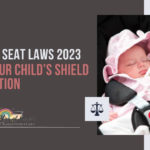Before traveling to or through a new state like Colorado, familiarize yourself with the specific car seat laws and regulations in that area.
Laws regarding child car seats can vary significantly from state to state, so being aware of the requirements in advance is essential for legal compliance and, most importantly, child safety.
Understanding and following the car seat laws Colorado is crucial to avoid legal issues and, more importantly, to protect your child in case of an accident.

Browse this Post
- 1 Official Colorado Child Passenger Safety Laws 2023
- 2 Rear-facing Car Seat Laws in Colorado
- 3 Forward-facing Car Seat Laws in Colorado
- 4 Booster Seat Laws in Colorado
- 5 When Can My Child Sit in the Front Seat in Colorado?
- 6 Colorado Law Regarding Leaving Child In Car
- 7 Faqs For Car Seat Laws Colorado
- 8 Conclusion
Official Colorado Child Passenger Safety Laws 2023
Proper car seat use is critical to child safety on the road. The car seat laws Colorado play a vital role in educating parents about the importance of using the proper restraint systems and providing resources and support to make it happen.
According to Colorado Revised Statutes 2018,
“Every child who is at least eight years of age but less than sixteen years of age who is being transported in this state in a motor vehicle or in a vehicle operated by a child care center shall be properly restrained in a safety belt or child restraint system according to the manufacturer’s instructions.”
-TITLE 42, VEHICLES AND TRAFFIC
Adhering to the manufacturer’s instructions for these restraints is crucial to ensure the safety of these young passengers. Laws like these are in place to protect children and reduce the risk of injuries in the event of a motor vehicle accident.
Rear-facing Car Seat Laws in Colorado
Rear-facing car seats with five-point restraints are designed to provide maximum protection for infants, especially those under 12 months of age and weighing less than 20 pounds.
The American Academy of Pediatrics (AAP) advises parents to keep children in a rear-facing car seat for as long as possible. These seats are designed to distribute crash forces evenly across the child’s body.
In a rear-facing position, the car seat cradles the child’s body, allowing the seat to absorb and distribute the forces generated during a collision.
This reduces the impact on the child’s head and neck, which are still developing and relatively fragile. Rear-facing seats minimize the risk of neck injuries, preventing the child’s head from being thrown forward during sudden stops or accidents.
Rear-facing seats support the natural curvature of a child’s spine and are designed to accommodate the physical development of young children. This design aligns with the child’s anatomical needs for protection.

Forward-facing Car Seat Laws in Colorado
After a child outgrows the rear-facing seat, they should transition to a forward-facing car seat with a harness. This is appropriate for children over 20 pounds and at least 2 years of age, depending on the specific car seat’s models.
Five-Point Harness System: Restrain children aged 2 to 4 years in a car seat equipped with a five-point harness system. This harness system includes two shoulder straps, two hip straps, and a crotch strap.
A five-point harness system distributes crash forces across multiple points on a child’s body, providing superior protection compared to a lap and shoulder belt.
Back Seat Placement: Keep your children in the vehicle’s back seat, as this is generally considered the safest location for them.
Upper-Tether Strap Use: Always use the upper-tether strap according to the vehicle owner’s manual and the child restraint manufacturer’s instructions. The upper-tether strap helps secure the car seat more effectively, adding an extra layer of protection during a collision.

Booster Seat Laws in Colorado
Children should remain in a belt-positioning booster seat in the back seat of a vehicle until they can use a seat belt that fits them correctly. Between the ages of 4 and 8, they should continue riding in a booster seat.
This typically means that the child is tall enough to sit without slouching, and the lap belt lies across the upper thighs while the shoulder belt crosses the chest and shoulder.
By using a booster seat, parents can substantially improve the safety of older children who have outgrown their forward-facing car seats but are not yet tall enough to use the vehicle’s seat belt without additional support safely.
This is why booster seats are recommended as part of child passenger safety guidelines.
When Can My Child Sit in the Front Seat in Colorado?
The question is about the appropriate age or circumstances for a child to sit in the front seat of a vehicle in Colorado, taking into consideration safety recommendations and legal requirements.
The answer is safety experts generally advise that children aged 12 and younger should ride in the back seat of a vehicle.
This advice is based on concerns related to the safety of children in the front seat, particularly in relation to the deployment of airbags, which can be dangerous for younger passengers in the event of a crash.
Furthermore, Colorado law specifies that children younger than 1 year and weighing less than 20 pounds must be placed in the back seat of a vehicle.
However, it is emphasized that the safest practice is to keep children in the back seat until they reach the age of 13. This recommendation aligns with the safety guidelines provided by experts and aims to minimize the risk to children when traveling in a vehicle.

Colorado Law Regarding Leaving Child In Car
Colorado does not have specific state laws stipulating a minimum age at which a child can be left alone.
The responsibility for determining when a child is mature enough to be left alone typically falls on the parents or guardians, and it is generally guided by their judgment regarding the child’s maturity, responsibility, and safety.
However, while there may not be a specific age requirement in the state law, parents must use common sense and consider their child’s individual needs and abilities when deciding if they are ready to be left alone.
Factors to consider may include the child’s age, maturity level, ability to handle emergencies, and the length of time they will be left alone.
It’s also a good practice to ensure that the child knows how to contact someone in case of an emergency and that they are aware of basic safety precautions.

Faqs For Car Seat Laws Colorado
1. Do Colorado Car Seat Laws Apply To Taxis Car Seat?
No, but car seats and booster seats are still highly recommended for children’s safety when traveling in a taxi car seat.
Prioritizing the use of appropriate child restraints is crucial in ensuring young passengers’ safety, even in exempt vehicles like taxis. Safety should always be a top priority when transporting children.
2. Are There Any Upcoming Changes To Colorado Car Seat Law?
No, Colorado’s car seat laws haven’t been updated recently, and there is uncertainty about any forthcoming changes. However, parents must be aware of the current regulations and periodically check for updates to ensure the safety of children.
3. Is It Illegal To Smoke In A Car With A Child In Colorado?
Yes, if law enforcement stops a vehicle for another reason and discovers that someone is smoking in the car with a minor present, they can issue a fine of $150 or require community service.
It’s essential for residents and visitors to be aware of and comply with local smoking regulations to avoid any potential fines or penalties.
4. Are Previously Used Car Seats Safe To Use?
Used car seats can be safe to use if certain conditions are met and precautions are taken. Before using a used car seat, check for any recalls associated with that specific make and model.
You can do this by contacting the manufacturer or checking their website. However, if you find any damage, it’s best not to use the seat, as it may not provide adequate protection in the event of a crash.
Conclusion
In conclusion, being well-informed about Colorado’s car seat laws in 2023 is crucial for parents and caregivers.
While there haven’t been recent updates to the laws, it’s essential to remain vigilant and stay updated through reliable sources like the Colorado Department of Transportation.
Remember that using a car seat with the owner’s manual, all safety labels intact, and a clear history is paramount for child safety.
More Resources on Car Seat Laws
California Car Seat Laws
Ohio Car Seat Laws
New York Car Seat Laws
Wisconsin Car Seat Laws
Virginia Car Seat Laws
Arizona Car Seat Laws
Michigan Car Seat Laws
Missouri Car Seat Laws
Indiana Car Seat Laws
Maine Car Seat Laws
Louisiana’s Car Seat Laws
NJ (New Jersey) Car Seat Law
North Carolina Car Seat Laws
Texas Car Seat Laws
Kentucky Car Seat Laws
South Carolina Car Seat Laws
CT (Connecticut) Car Seat Laws
My name is Olivia Brown, and I’m a New York-based blogger and stay-at-home parent. Former business executive enjoying retirement and time with kids Lily and Max. On my blog, I review things for kids and offer my honest thoughts and insights to other parents who may be having the same or similar experiences.





